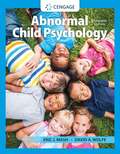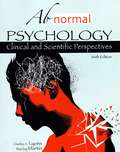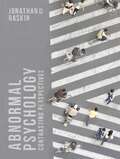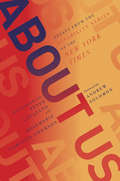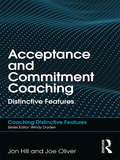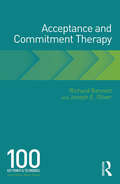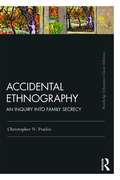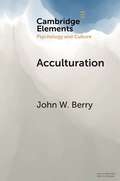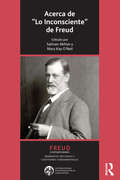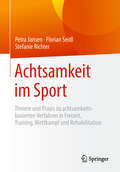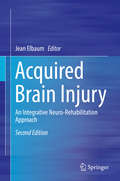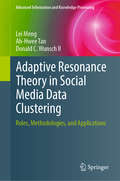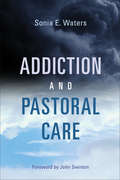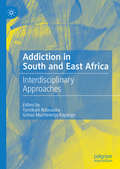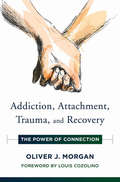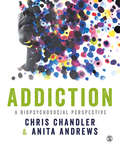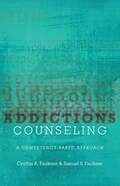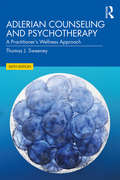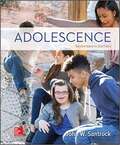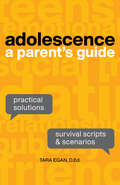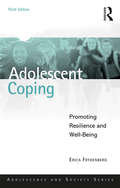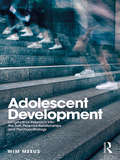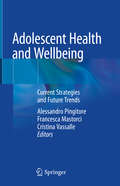- Table View
- List View
Abnormal Child Psychology (Mindtap Course List)
by David Wolfe Eric MashABNORMAL CHILD PSYCHOLOGY, 7th Edition introduces you to childhood and adolescent disorders, treatment, and prevention using an approach that recognizes the interconnectedness of biological, psychological, social, and emotional influences. You'll view each disorder from the perspective of the whole child, with diagnostic criteria as well as emphasis on the strengths of the individual, environmental circumstances, issues pertaining to younger and older age groups, and the risk and protective factors affecting developmental pathways. Case histories, examples, and first-person accounts are at the heart of the text, bringing to life theories, disorders, and the real people who are affected by them.
Abnormal Psychology: Clinical & Scientific Perspectives
by Barclay Martin Charles LyonsThe United States spends more money on mental disorders than on any other health condition, with heart disease and cancer trailing far behind. As important as that statistic is, it is not the main reason that it is incumbent upon us to understand more about these conditions. We all have friends or family members who have battled with mental health in some way. It is therefore important to learn what we can about mental disorders, including how they are identified, how they develop, how they can be treated, and, ultimately, how they can be prevented. <p><p> As in the previous editions of Abnormal Psychology: Clinical and Scientific Perspectives, this sixth edition was prepared with the goal of producing a readable, useful, inexpensive referenced resource that could serve as a primary text for students in undergraduate abnormal psychology courses. It provides a thorough (and critical) overview of the official system for classifying mental disorders - the Diagnostic and Statistical Manual of Mental Disorders, Fifth Edition (DSM-5) - describing the many ways in which the DSM-5 differs from its predecessors. As this text reviews both past and present treatment approaches and their supporting research, it also encourages students to think critically and to evaluate the strength of evidence.
Abnormal Psychology: Contrasting Perspectives
by Jonathan D. RaskinThis groundbreaking core textbook offers a comprehensive overview of different approaches to the assessment and treatment of psychological disorders. The book retains important diagnostic perspectives, including the DSM-5, ICD-10, ICD-11 and PDM, but also widens the scope of coverage beyond mainstream psychiatric models to include psychological, biological, historical, sociocultural and therapeutic approaches. Contemporary and well-balanced, this book provides an even-handed and holistic foundation, allowing students to develop a strong critical mindset while retaining a robust research-driven orientation. This book is ideal for undergraduate and postgraduates students on abnormal psychology, psychopathology, mental health or clinical psychology modules.
About Us: Essays From The New York Times' Disability Series
by Rosemarie Garland-Thomson Peter CatapanoBased on the pioneering New York Times series, About Us collects the personal essays and reflections that have transformed the national conversation around disability. <P><P> Boldly claiming a space in which people with disabilities can be seen and heard as they are—not as others perceive them—About Us captures the voices of a community that has for too long been stereotyped and misrepresented. Speaking not only to those with disabilities, but also to their families, coworkers and support networks, the authors in About Us offer intimate stories of how they navigate a world not built for them. Since its 2016 debut, the popular New York Times’ “Disability” column has transformed the national dialogue around disability. Now, echoing the refrain of the disability rights movement, “Nothing about us without us,” this landmark collection gathers the most powerful essays from the series that speak to the fullness of human experience—stories about first romance, childhood shame and isolation, segregation, professional ambition, child-bearing and parenting, aging and beyond. <P><P>Reflecting on the fraught conversations around disability—from the friend who says “I don’t think of you as disabled,” to the father who scolds his child with attention differences, “Stop it stop it stop it what is wrong with you?”—the stories here reveal the range of responses, and the variety of consequences, to being labeled as “disabled” by the broader public. <P><P>Here, a writer recounts her path through medical school as a wheelchair user—forging a unique bridge between patients with disabilities and their physicians. An acclaimed artist with spina bifida discusses her art practice as one that invites us to “stretch ourselves toward a world where all bodies are exquisite.” With these notes of triumph, these stories also offer honest portrayals of frustration over access to medical care, the burden of social stigma and the nearly constant need to self-advocate in the public realm. <P><P>In its final sections, About Us turns to the questions of love, family and joy to show how it is possible to revel in life as a person with disabilities. Subverting the pervasive belief that disability results in relentless suffering and isolation, a quadriplegic writer reveals how she rediscovered intimacy without touch, and a mother with a chronic illness shares what her condition has taught her young children. With a foreword by Andrew Solomon and introductory comments by co-editors Peter Catapano and Rosemarie Garland-Thomson, About Us is a landmark publication of the disability movement for readers of all backgrounds, forms and abilities. <P><P>Topics Include: Becoming Disabled • Mental Illness is not a Horror Show • Disability and the Right to Choose • Brain Injury and the Civil Right We Don’t Think • The Deaf Body in Public Space • The Everyday Anxiety of the Stutterer • I Use a Wheelchair. And Yes, I’m Your Doctor • A Symbol for “Nobody” That’s Really for Everybody • Flying While Blind • My $1,000 Anxiety Attack • A Girlfriend of My Own • The Three-Legged Dog Who Carried Me • Passing My Disability On to My Children • I Have Diabetes. Am I to Blame? • Learning to Sing Again • A Disabled Life is a Life Worth Living
Acceptance and Commitment Coaching: Distinctive Features (Coaching Distinctive Features)
by Joe Oliver Jon HillJon Hill and Joe Oliver introduce the Acceptance and Commitment Coaching (ACC) model with clarity and accessibility, defining it as an approach that incorporates mindfulness and acceptance, focusing on committed, values-based actions to help coachees make meaningful changes to their lives. Acceptance and Commitment Coaching: Distinctive Features explains the ACC model in such a way that the reader will be able to put it into practice immediately, as well as offering sufficient context to anchor the practical tools in a clear theoretical framework. Split into two parts, the book begins by emphasising ACC’s relevance and its core philosophy before providing an overview of its key theoretical points and the research that supports it. The authors also explain the six key ACC processes: defusion, acceptance, contact with the present moment, self as context, values and committed action, and explain how to use them in practice. Hill and Oliver address essential topics, such as the critical work needed before and as you begin working with a coachee, how to use metaphor as an effective tool as a coach, and they finish by offering helpful tips on how to help coachees maintain their positive changes, how to make ACC accessible to all types of client, how to manage challenging coachees and how to work with both individuals and groups using ACC. Aimed specifically at coaches, the book offers context, examples, practicality and a unique combination of practical and theoretical points in a concise format. Acceptance and Commitment Coaching: Distinctive Features is essential reading for coaches, coaching psychologists and executive coaches in practice and in training. It would be of interest to academics and students of coaching psychology and coaching techniques, as well as Acceptance and Commitment Therapy (ACT) practitioners looking to move into coaching.
Acceptance and Commitment Therapy: 100 Key Points and Techniques (100 Key Points)
by Richard Bennett Joe OliverAcceptance and Commitment Therapy: 100 Key Points and Techniques offers a comprehensive, yet concise, overview of the central features of the philosophy, theory, and practical application of ACT. It explains and demonstrates the range of acceptance, mindfulness, and behaviour change strategies that can be used in the service of helping people increase their psychological flexibility and wellbeing. Divided into three main parts, the book covers the ‘Head, Hands, and Heart’ of the approach, moving from the basics of behavioural psychology, via the key principles of Relational Frame Theory and the Psychological Flexibility model, to a detailed description of how ACT is practiced, providing the reader with a solid grounding from which to develop their delivery of ACT-consistent interventions. It concludes by addressing key decisions to make in practice and how best to attend to the therapeutic process. The authors of Acceptance and Commitment Therapy bring a wealth of experience of using ACT in their own therapy practice and of training and supervising others in developing knowledge and skills in the approach. This book will appeal to practitioners looking to further their theoretical knowledge and hands-on skills and those seeking a useful reference for all aspects of their ACT practice.
Accidental Ethnography: An Inquiry into Family Secrecy (Writing Lives Ser. #7)
by Christopher N. PoulosEach family has its secrets, ones that shape family communication and relationships in a way generally unknown to the outsider and often the family itself. Autoethnographers, students of these relationships, confront many silences in their attempts to understand these social worlds. Now issued as a Routledge Education Classic Edition, Accidental Ethnography delves into this shadowy world of pain and loss in the hopes of finding productive, ethical avenues for transforming the secret lives of families into powerful narratives of hope. It merges autoethnographic method with the therapeutic power of storytelling to heal family wounds. A new preface text by the author reflects on the changes in the field of qualitative research and on his own research journey since the publication of the original edition.
Acculturation: A Personal Journey across Cultures (Elements in Psychology and Culture)
by John W. BerryAcculturation is the process of group and individual changes in culture and behaviour that result from intercultural contact. These changes have been taking place forever, and continue at an increasing pace as more and more peoples of different cultures move, meet and interact. Variations in the meanings of the concept, and some systematic conceptualisations of it are presented. This is followed by a survey of empirical work with indigenous, immigrant and ethnocultural peoples around the globe that employed both ethnographic (qualitative) and psychological (quantitative) methods. This wide-ranging research has been undertaken in a quest for possible general principles (or universals) of acculturation. This Element concludes with a short evaluation of the field of acculturation; its past, present and future.
Acerca de Lo Inconsciente de Freud
by Salman Akhtar Mary Kay O'Neil Jose Maria VacaIf there ever was one word that could represent the essence of Freud's work, that word would be 'unconscious'. Indeed, Freud himself regarded his 1915 paper 'The Unconscious' as central to clarifying the fundamentals of his metapsychology. The paper delineates the topographic model of the mind and spells out the concepts of primary and secondary process thinking, thing and word presentations, timelessness of the unconscious, condensation and symbolism, unconscious problem solving, and the relationship between the system Ucs and repression. Examining these proposals in the light of contemporary psychoanalytic theory as well as from the perspective of current neurophysiology and ethology, nine distinguished analysts take Freud's ideas further in ways that have implications for both psychoanalytic theory and practice.
Achtsamkeit im Sport: Theorie und Praxis zu achtsamkeitsbasierten Verfahren in Freizeit, Training, Wettkampf und Rehabilitation
by Petra Jansen Florian Seidl Stefanie RichterIn vielen Lebens- und Berufsbereichen spielt die Achtsamkeit eine große Rolle, wenn es um die Reduktion von Stress und die Fokussierung der Aufmerksamkeit geht. Auch im Sport gewinnt das Konzept der Achtsamkeit zur Leistungssteigerung zunehmend an Bedeutung. Gerade in Wettkampfsituationen gilt es, den Kopf frei zu bekommen, wobei Achtsamkeit helfen kann.Dieses Fachbuch stellt zum einen die theoretischen Grundlagen der Achtsamkeit, des Sports und der Leistung dar. Es macht darüber hinaus auf die Vielfältigkeit des Sportbegriffs und auf die bereits bestehenden achtsamkeitsbasierten Sportprogramme aufmerksam. Der anschließende Praxisteil greift die unterschiedlichen Facetten des Sportbegriffs auf und bietet somit auf den Kontext des Sports bezogene praktische Achtsamkeitsübungen, die in Training, Wettkampf, Rehabilitation und im Freizeitsport eingesetzt werden können.
Acquired Brain Injury: An Integrative Neuro-Rehabilitation Approach
by Jean ElbaumThis book presents a comprehensive interdisciplinary team approach to the rehabilitation of acquired brain injury (ABI) survivors. Medical and clinical specialists will receive a deeper understanding of not only each other’s roles but of their complementary functions in this field. Many case examples are provided, illustrating a wide range of challenges and stages of recovery. This edition features 3 entirely new chapters and multiple updated chapters by new and returning authors.Featured in the coverage: The role of Robotics in acquired brain injuryA comprehensive chapter on physical therapy in ABIOutstanding recoveries woven together by a video news producer who recovered from a meningioma State of the art updates on neurosurgery, neurology, physiatry, neuropsychiatry and neuro-optometry.Updated chapters on neuropsychology, speech-language and occupational therapies including new technology and approaches as well as evidence based practicesPsychosocial challenges and treatment following ABIThe importance of family as team membersPost rehabilitation options and experiencesAcquired Brain Injury: An Integrative Neuro-Rehabilitation Approach, 2nd edition provides clarity and context regarding the rehabilitation goals and processes for rehabilitation specialists, interdisciplinary students of neuro-rehabilitation as well as practicing clinicians interested in developing their knowledge in their field.
Adaptive Resonance Theory in Social Media Data Clustering: Roles, Methodologies, and Applications (Advanced Information and Knowledge Processing)
by Lei Meng Ah-Hwee Tan Donald C. Wunsch IISocial media data contains our communication and online sharing, mirroring our daily life. This book looks at how we can use and what we can discover from such big data:Basic knowledge (data & challenges) on social media analyticsClustering as a fundamental technique for unsupervised knowledge discovery and data miningA class of neural inspired algorithms, based on adaptive resonance theory (ART), tackling challenges in big social media data clustering Step-by-step practices of developing unsupervised machine learning algorithms for real-world applications in social media domainAdaptive Resonance Theory in Social Media Data Clustering stands on the fundamental breakthrough in cognitive and neural theory, i.e. adaptive resonance theory, which simulates how a brain processes information to perform memory, learning, recognition, and prediction.It presents initiatives on the mathematical demonstration of ART’s learning mechanisms in clustering, and illustrates how to extend the base ART model to handle the complexity and characteristics of social media data and perform associative analytical tasks.Both cutting-edge research and real-world practices on machine learning and social media analytics are included in the book and if you wish to learn the answers to the following questions, this book is for you:How to process big streams of multimedia data?How to analyze social networks with heterogeneous data?How to understand a user’s interests by learning from online posts and behaviors?How to create a personalized search engine by automatically indexing and searching multimodal information resources? .
Addiction and Pastoral Care
by Sonia E. WatersA timely resource treating addiction holistically as both a spiritual and a pathological conditionSubstance addictions present a unique set of challenges for pastoral care. In this book Sonia Waters weaves together personal stories, research, and theological reflection to offer helpful tools for ministers, counselors, chaplains, and anyone else called to care pastorally for those struggling with addiction.Waters uses the story of the Gerasene demoniac in Mark&’s Gospel to reframe addiction as a &“soul-sickness&” that arises from a legion of individual and social vulnerabilities. She includes pastoral reflections on oppression, the War on Drugs, trauma, guilt, discipleship, and identity. The final chapters focus on practical-care skills that address the challenges of recovery, especially ambivalence and resistance to change.
Addiction and Pastoral Care
by John Swinton Sonia E. WatersA timely resource treating addiction holistically as both a spiritual and a pathological conditionSubstance addictions present a unique set of challenges for pastoral care. In this book Sonia Waters weaves together personal stories, research, and theological reflection to offer helpful tools for ministers, counselors, chaplains, and anyone else called to care pastorally for those struggling with addiction.Waters uses the story of the Gerasene demoniac in Mark’s Gospel to reframe addiction as a “soul-sickness” that arises from a legion of individual and social vulnerabilities. She includes pastoral reflections on oppression, the War on Drugs, trauma, guilt, discipleship, and identity. The final chapters focus on practical-care skills that address the challenges of recovery, especially ambivalence and resistance to change.
Addiction in South and East Africa: Interdisciplinary Approaches
by Grivas Muchineripi Kayange Yamikani NdasaukaThis book explores both the existence and prevalence of addiction in South and East Africa, departing from traditional assumptions about addiction in the region. The authors employ an interdisciplinary approach to understand the actual prevalence of addiction and the forms it takes in South and East Africa. The book also addresses the perceptions and conceptualisation of addiction in the region, in addition to discussing specific issues related to drug and alcohol abuse and addiction, social media addiction, and sex addiction.
Addiction, Attachment, Trauma and Recovery: The Power Of Connection (Norton Series on Interpersonal Neurobiology #0)
by Oliver J. MorganA new model of addiction that incorporates neurobiology, social relationships, and ecological systems. Understanding addiction is no longer just about understanding neurons or genes, broken brain functioning, learning, or faulty choices. Oliver J. Morgan provides a fresh take on addiction and recovery by presenting a more inclusive framework than traditional understanding. Cutting- edge work in attachment, interpersonal neurobiology, and trauma is integrated with ecological- systems thinking to provide a consilient and comprehensive picture of addiction. Humans are born into connection and require nourishing relationships for healthy living. Adversities, however, bring fragmentation and create the conditions for ill health. They create vulnerabilities. In order to cope, individuals can turn to alternatives, “substitute relationships” that ease the pain of disconnection. These can become addictions. Addiction, Attachment, Trauma, and Recovery presents a model, a method, and a mandate. This new focus calls for change in the established ways we think and behave about addiction and recovery. It reorients understanding and clinical practice for mental health and addiction counselors, psychologists, and social workers, as well as for addicts and those who love them.
Addiction: A biopsychosocial perspective
by Dr Chris Chandler Ms Anita AndrewsAddiction: A biopsychosocial perspective provides students with an evidence-based approach to addiction whilst covering a broad range of topics, critical perspectives and influential theories in addiction. With chapters discussing key theories, psychological, biological and societal aspects of addiction, this is a highly accessible and essential resource for students and researchers that: Offers an evidence-based discussion of addiction Addresses the neuroscience and psychology of addiction Provides a critical account of the science and research in addiction Includes chapter overviews and summaries, learning aims and case studies to help students in their study
Addiction: A biopsychosocial perspective
by Dr Chris Chandler Ms Anita AndrewsAddiction: A biopsychosocial perspective provides students with an evidence-based approach to addiction whilst covering a broad range of topics, critical perspectives and influential theories in addiction. With chapters discussing key theories, psychological, biological and societal aspects of addiction, this is a highly accessible and essential resource for students and researchers that: Offers an evidence-based discussion of addiction Addresses the neuroscience and psychology of addiction Provides a critical account of the science and research in addiction Includes chapter overviews and summaries, learning aims and case studies to help students in their study
Addictions Counseling: A Competency-based Approach
by Cynthia A. Faulkner Samuel FaulknerWritten by authors with extensive experience as practitioners and educators, this text serves as a straightforward resource for undergraduate and graduate students who have a goal of becoming counselors or therapists in the field of addiction. <p><p>While many books on the subject follow a similar format (i.e., introduction, classification of drugs, theories of counseling, etc.), Addictions Counseling takes one client and follows her through the entire treatment experience-from referral and assessment, all the way through relapse prevention and discharge planning. In following her through the treatment journey, readers are introduced to theories and techniques for approaching each of the topics discussed. This book is a must-read for anybody interested in pursuing a career as an addiction specialist.
Adlerian Counseling and Psychotherapy: A Practitioner's Wellness Approach
by Thomas J. SweeneyAdlerian Counseling and Psychotherapy, now in its sixth edition, places a fresh emphasis on wellness both in concept and in practice. Written with the practitioner in mind, this text provides a definitive overview of the theory and practice of individual psychology based on the work of both Alfred Adler and Rudolf Dreikurs. The sixth edition retains the clarity, focus, and practicality of the previous editions and incorporates research, methods, and techniques to illustrate the usefulness of the Adlerian approach with children, adolescents, and adults of all ages in settings with individuals, groups, and couples. Parent education, career counseling, lifestyle assessment and counseling, and clinical diagnosis and psychotherapy are all discussed, as are applications for working with clients of different cultural and ethnic backgrounds and gender orientations. Neuroscience concepts and methods are described in case examples that illustrate their effectiveness across the lifespan. Readers will also find clinical examples from lifestyle assessment and family counseling meetings, as well as tables and figures that augment the activities and review questions included with each chapter.
Adolescence
by John W. SantrockAs a master teacher, John Santrock connects current research with real-world application, helping students see how developmental psychology plays a role in their own lives and future careers. Through an integrated learning goals system, this comprehensive approach to adolescent development helps students gain the insight they need to study smarter, stay focused, and improve performance.
Adolescence: A Parent's Guide
by Tara Egan D.Ed.Survive adolescence—with the guide no parent should be without Getting through adolescence is tough, but you can help your child make it through—and maintain a strong relationship! Covering everything from late childhood to puberty to emerging adulthood, Adolescence: A Parent's Guide offers you and your child the kind of sound and thoughtful advice you'll wish you'd gotten in your adolescence. Divided into five chapters—each covering a specific age range—this guide digs deep into the most common aspects of adolescence. Whether it's dealing with dishonesty, managing changing relationships, or handling the age-old question of sex, this simple and straightforward guide has your back. You get a toolbox full of effective approaches that are easy to implement and can be tailored to your specific needs. Adolescence: A Parent's Guide includes: Understanding today's adolescents—Refresh your knowledge with the most modern and up-to-date information available. Actionable advice—Discover strategies for overcoming common adolescent hurdles—like when kids start testing limits or stressing out over social media. Talking it out—Sample scripts and scenarios provide helpful guidelines for navigating challenging conversations and situations with your growing child. Make sure the two of you get through adolescence in one piece with this comprehensive book.
Adolescent Coping: Promoting Resilience and Well-Being (Adolescence and Society)
by Erica FrydenbergHow do young people cope with the multitude of difficult situations and scenarios that are associated with growing up, like anxiety and depression, as well as illness, rejection and family breakdown? How can we facilitate and encourage, through a combination of health, well-being and positive mindset, healthy development during adolescence and beyond? With a substantial focus on the positive aspects of coping, including an emphasis on developing resilience and the achievement of happiness, Erica Frydenberg presents the latest developments in the field of coping. Adolescent Coping highlights the ways in which coping can be measured and implemented in a wide range of circumstances and contexts, with suggestions for the development of coping skills and coping skills training, and it provides strong scholarly evidence for the concepts and constructs that it promotes as providing a pathway to resilience. The work is framed as an ongoing interaction between individuals and their environments as represented by the psychosocial ecological model of Bronfenbrenner. The major theories of coping are articulated that take account of the transactional model, resources theories and proactive models of coping. Areas of recent interest such as neuroscience and epigenetics are included, alongside a new chapter, ‘Cyberworld’, which provides insights on new and relevant topics such as mindfulness and the impact of social media as they relate to coping in the contemporary context. Adolescent Coping will be of interest to practitioners in psychology, social work, sociology, education and youth and community work as well as to students on courses in adolescent development in these fields.
Adolescent Development: Longitudinal Research into the Self, Personal Relationships and Psychopathology
by Wim MeeusThis groundbreaking book provides students and researchers with a unique overview of the longitudinal study of the development of young people from the ages of 12 to 25. It offers a comprehensive introduction into the multiple theories on the development of the self, personal relationships and psychopathology in adolescence, alongside a non-statistical overview of the many longitudinal models used to study development. The book includes key topics such as the development of the self, adolescent identity and personality; the development of parent-adolescent relationships; friendships and the understanding of others; and the development of psychosocial problems such as anxiety, depression, delinquency, aggression, and substance use. Meeus highlights multiple findings showing how these processes are integrated and identifies eight fundamental patterns of adolescent development to help determine why most adolescents develop into mature and organized individuals towards the end of this life stage, whilst a substantial minority show an inability to mature. It is essential reading for graduate students and researchers in adolescent development and anyone seeking to use longitudinal research methodology in the social and behavioral sciences.
Adolescent Health and Wellbeing: Current Strategies and Future Trends
by Alessandro Pingitore Francesca Mastorci Cristina VassalleThis book presents a detailed and updated review of the widespread changes that take place during adolescence, adopting a preventive perspective that reflects physical, social, cognitive, and emotional changes. It addresses a broad range of aspects, including: the preventive programs and their systemic effects; the role of environment in influencing the healthy behaviors of adolescents and young adults; the use of e-Health technology in health and behavioral interventions for adolescents; and the clinical and prognostic implications of primordial prevention in healthy adolescents. All of these elements are subsequently reviewed using a multidimensional approach, in order to offer extensive information on the complex changes that characterize adolescents’ physiological, psychological, and neurobiological development.In addition, the book depicts the preventive strategies currently used in various social settings (school, family, sport club, health policies) aimed not only at reducing lifestyle risk behaviors, but also at improving resilience, happiness, social involvement, self-esteem, and sociability. This update is essential in the light of the fact that, to date, prevention has mainly been directed towards adolescents with physical or mental disorders rather than their healthy peers. As such, the book offers a valuable tool for pediatricians, child and adolescents psychiatrists, and for all professionals involved in Health Promotion and Disease Prevention.
